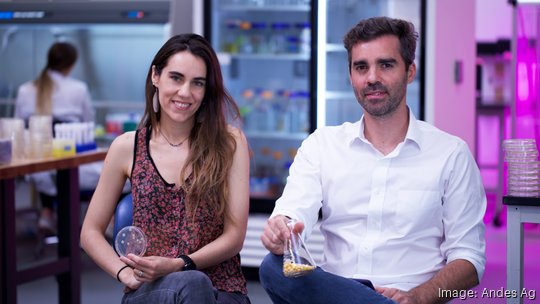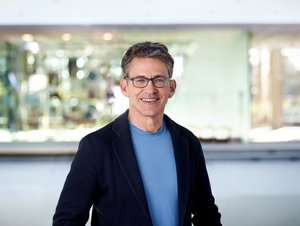
A Bay Area startup is using microbes to capture carbon from the atmosphere and sink it into farmland, and the company has raised $30 million to fuel its growth.
Based in Alameda, Andes is developing microbes that can be sprayed onto cropland when seeds are planted. The microbes pull carbon from the air into the soil, and the carbon then transforms into minerals like calcium carbonate.
The method simultaneously sequesters carbon and improves soil health, CEO and co-founder Gonzalo Fuenzalida told me. The company not only provides the product to farmers for free, but it also pays them a flat fee at the end of every year to encourage usage and increase farmers' earnings.
"This season, we have four times the demand we had last season, and the reason why is because this is truly a win-win for farmers," Fuenzalida said, because the technique increases the amount of income generated per acre. "I think we've found a way to unlock billions of acres from farmers that aren't necessarily aligned with the idea of climate change … but they have a good reason to participate."
The company says its product can help farmers increase net income by up to 25%.
To pay for this, Andes regularly collects soil samples and has it tested by third-parties to measure how much carbon has been captured. It then generates carbon offset credits that other corporations can buy to meet their own net zero emissions goals.
Andes then sells carbon offset credits directly to brokers as well as through marketplaces.
Fuenzalida declined to disclose what the company currently charges for removing one metric ton of carbon but it prices its carbon offset credits based on the volume of credits purchased in addition to the length of commitment. And Fuenzalida is aiming to get their prices below $100 per metric ton within 18 months.
The company has already removed around 50,000 tonnes of carbon, and the goal is to scale up to reach a gigaton.
Andes currently works with farmers in North Dakota, South Dakota, Minnesota and Wisconsin who primarily plant corn, soy, wheat, canola and sunflowers across 25,000 acres.
Next year, Andes is eyeing an expansion into South America beginning with Argentina, Uruguay and Brazil. Eventually, it will also continue expanding into more regions across the U.S.
And it's also developing a product to help farmers reduce the amount of synthetic nitrogen fertilizer that they have to purchase. Instead, Andes' microbes will be able to naturally fix nitrogen in the soil. That product will not be free.
Fuenzalida founded Andes in 2018 with CTO Tania Timmermann to harness beneficial microbes for industrial and agricultural uses.
"We have a lot of microbes in our bodies that make us healthy. The same is true for plants, animals and the whole environment. Life as we know it has been molded by microbes," Fuenzalida said. "Maybe they can also contribute to the future we want."
They raised $30 million from a Series A round, bringing its total funding to $38 million, the company said in a press release. Its investors include the venture arm of Monsanto's parent company, Leaps by Bayer, as well as Voyager VC, Yamaha Motor Ventures, Cavallo Ventures, KdT Ventures, Venturance, Germin8 and Accelr8.
Another East Bay startup has been developing microbes for nitrogen fixing in soil, as well. Berkeley-based Pivot Bio has raised $692 million since 2010, according to PitchBook, and is backed by Breakthrough Energy Ventures, Temasek Holdings, DARPA and Leaps by Bayer.
In 2017, Bayer also partnered with Boston-based Ginko Bioworks to develop microbe-based nitrogen fertilizers. Another Boston startup, Indigo Ag, is developing microbial treatments for agriculture, as well.
On Monday, the U.N. Intergovernmental Panel on Climate Change released a report calling for wealthy nations to immediately and drastically cut emissions in order to slow down warming over the next decade. Otherwise, "climate disasters will become so extreme that people will not be able to adapt" and the Earth's ecosystems will be "irrevocably altered," the Washington Post reported.





